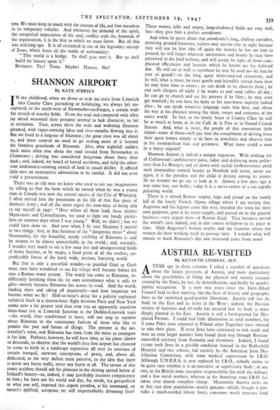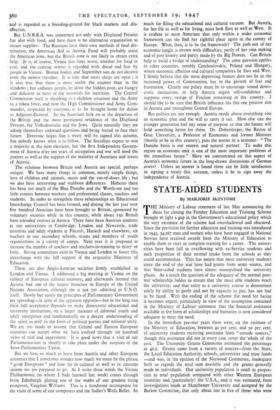AUSTRIA RE-VISITED
By KENNETH LINDSAY, M.P.
AYEAR ago in these columns I asked a number of questions about the future prospects of Austria, and more particularly about the possibilities of filling the physical and mental vacuum created by the Nazis, by war, by denazification, and finally by quadri- partite occupation. It is now two years since the Inter-Allied Council held its first meeting, but the facts of history and geography have so far outwitted quadripartite liberation. Austria still has its body in the East and its heart in the West ; indeed, the Russian seizure of factories and oil-wells has ensured that its body is more deeply planted in the East. Austria is still a battleground for Dis- placed Persons. I could find little diminution in total numbers, for if some Poles have returned to Poland other Yugoslays have entered to take their place. If some Jews have continued to trek south and west an even larger number have found their way through Russian- controlled territory from Rumania and elsewhere. Indeed, I found rr,000 such Jews in a pitiable condition housed in the Rothschild Hospital and two schools, fed entirely by the American Joint Dis- tribution Committee, with some medical supervision by I.R.O. Although U.N.R.R.A. is now replaced by I.R.O., nobody seems to be quite sure whether it is an executive or supervisory body ; at any rate, in the British zone executive responsibility lies with the military and a few social workers, whereas in the American zone I.R.O. has taken over almost complete charge. Meanwhile Austria looks on at this vast alien population—nearly 400,000—which, though it pro- vides a much-needed labour force, consumes much precious food
., and is regarded as a breeding-ground for black markets and .dis- affection.
But U.N.R.R.A. was concerned not only with Displaced Persons but also with food, and here there is no alternative organisation to secure supplies. The Russians have their own methods of food dis- tribution, the American Aid to Austria Fund will probably assist the American zone, but the British zone is not likely to obtain extra help. It is, of course, Vienna that fares worst, whether for food or coal, and the coming winter is regarded with dread and fear by people in Vienna. Bronze bodies and September sun do not deceive even the newest traveller. It is true that more shops are open ; it is also true that there is more under the counter than in the windows ; but ordinary people, let alone the hidden poor, are hungry and deficient in most of the essentials for nutrition. The Control Commission itself is shrinking to a skeleton structure and the Army to a token force, and now the High Commissioner and Army Com- mander, respected by everyone, is to be brought home for duties as Adjutant-General. So the Austrians look on at the departure of the British and the more permanent residence of the Displaced Persons, the Volksdeutsche and the Jews. Quite naturally they are asking themselves awkward questions and being forced to face their future. Everyone hopes that a treaty will be signed this autumn, but nobody knows what is to follow. The Socialists expect to win a majority at the next elections, but the first Independent Govern- ment of Austria after ten years of occupation and war will need the prayers as well as the support of the majority of Austrians and lovers of Austria.
The relations between Britain and Austria are special, perhaps unique. We have many things in common, mostly simple things, Jove of children and animals, music and the out-of-doors life ; but we also have interesting and stubborn differences. Hitherto there has been too much of the Blue Danube and the Worth-see and too little contact between workers and professional classes, teachers and students. In order to strengthen these relationships an Educational Interchange Council has been formed, and during the last year over five hundred Austrians have been brought to Britain, sponsored by voluntary societies while in this country, while about 15o British have attended courses in Austria. There have been Austrian students at our universities in Cambridge, London and Newcastle, trade unionists and adult students at Fircroft, Harlech and elsewhere, six teachers in our secondary schools, scouts and members of youth organisations in a variety of camps. Next year it is proposed to increase the number of teachers and teachers-in-training to thirty or forty. Strong committees exist in Vienna and London to foster this interchange with the full support of the respective Ministers of Education.
There are also Anglo-Austrian societies firmly established in London and Vienna. I addressed a big meeting in Vienna on the subject of European cultural recovery, and afterwards learned that Austria had one of the largest branches in Europe of the United Nations Association, although she is not yet admitted to U.N.O. itself. Slowly but surely the principles of Parliamentary Government are spreading—in spite of the apparent opposite—but in the long run their full acceptance depends on more democratic educational and university institutions, on a larger measure of informal youth and adult enterprises and fundamentally on a deeper understanding of the spirit as well as the form of political parties and national unity. We are too ready to assume that Central and Eastern European countries can accept what we have evolved through six hundred years of trial and experiment. It is good news that a visit of our Parliamentarians is shortly to take place under the auspices of the Inter-Parliamentary Union.
But we have so much to learn from Austria and other European countries that I sometimes wonder how much we mean by the phrase "good Europeans" and how far in cultural as well as in customs unions we are prepared to go. As I write these words the Vienna Philharmonic (to whom I bade farewell last week) comes through from Edinburgh playing one of the works of our greatest living composer, Vaughan Williams. This is a handsome recompense for the visits of some of our composers and the Sacller's Wells Ballet. So much for filling the educational and cultural vacuum. But Austria, for her life as well as for living, must look East as well as West. It is evident to most Austrians that only within a wider economic framework can she find her rightful place again in the comity of Europe. What, then, is to be the framework? The path out of her economic jungle is strewn with difficulties, partly of her own making and of past history and partly made by the Big Powers. Can Britain help to build a bridge of understanding? The same question applies to other countries, notably Czechoslovakia, Poland and Hungary, where economic affinities and cultural sympathies lie East and West. I firmly believe that the most depressing feature does not lie in the increased power of Communism, but in the growth of fear and frustration. Clearly our policy must be to encourage sound demo- cratic institutions, to help Austria regain self-confidence and suppress every vestige of Fascism remaining in the country. I should like to be sure that British influence has this one positive aim in Austria and throughout Central Europe.
But politics are not enough. Austria needs above everything else an economic plan and the will to carry it out. How else can the younger generation feel any sense of purpose or that the future will hold something better for them. Dr. Dohetslerger, the Rector of Graz University, a Professor of Economics and former Minister (shortly to be in this country), puts the matter in a sentence : "The Danube basin is our nearest and natural partner. To make this region an economic unit is one of the most important problems of the immediate future." Have we concentrated on this aspect of Austria's economic future in the long-drawn discussions of German assets? Unless an answer is found there can be little satisfaction in signing a treaty this autumn, unless it be to sign away the independence of Austria.



































 Previous page
Previous page